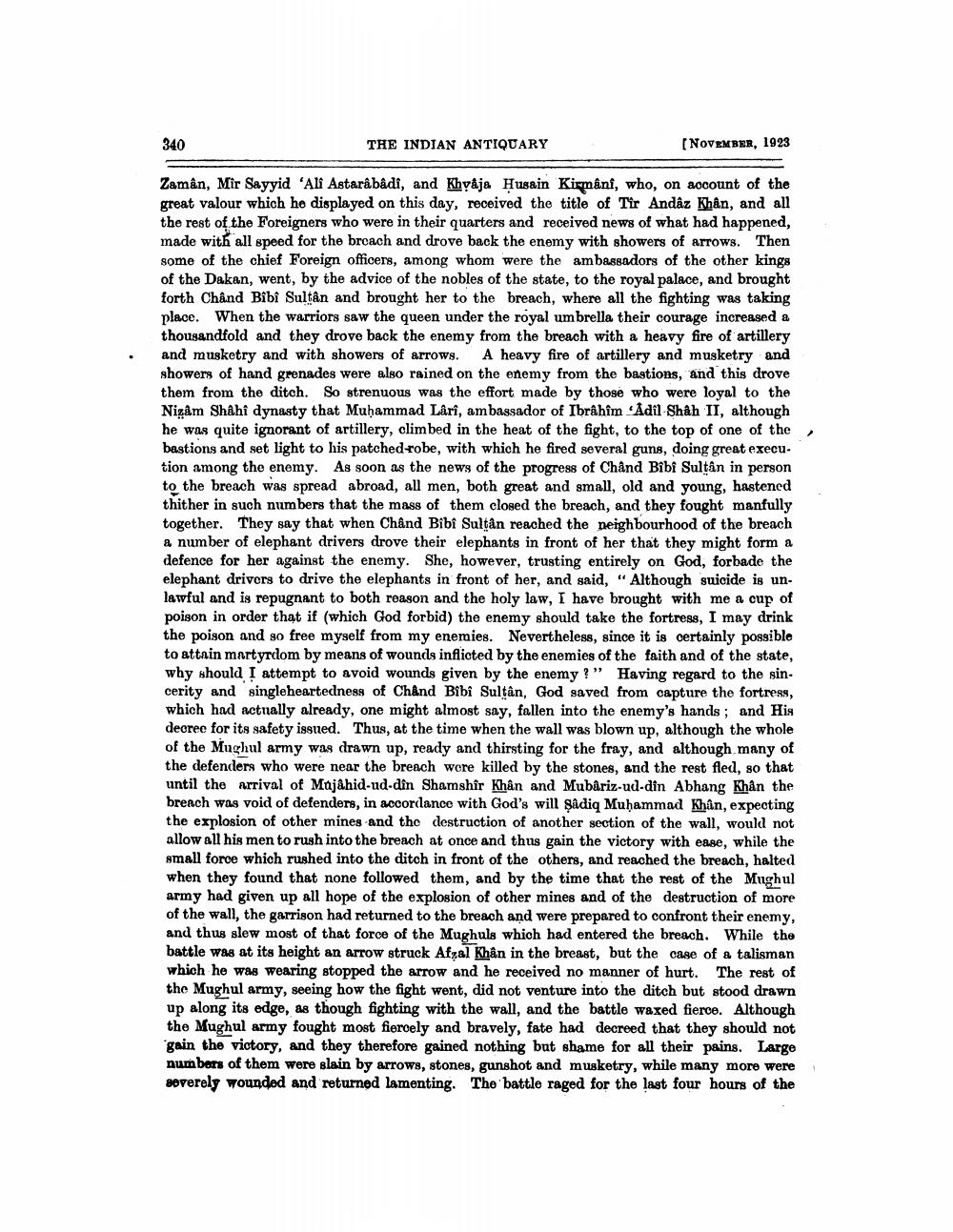________________
340
THE INDIAN ANTIQUARY
[NOVEMBER, 1923
Zamân, Mir Sayyid 'Ali Astarâbâdi, and Khyâja Husain Kirmani, who, on account of the great valour which he displayed on this day, received the title of Tir Andaz Khân, and all the rest of the Foreigners who were in their quarters and received news of what had happened, made with all speed for the broach and drove back the enemy with showers of arrows. Then some of the chief Foreign officers, among whom were the ambassadors of the other kings of the Dakan, went, by the advice of the nobles of the state, to the royal palace, and brought forth Chånd Bibi Sultân and brought her to the breach, where all the fighting was taking place. When the warriors saw the queen under the royal umbrella their courage increased a thousandfold and they drove back the enemy from the breach with a heavy fire of artillery and musketry and with showers of arrows. A heavy fire of artillery and musketry and showers of hand grenades were also rained on the enemy from the bastions, and this drove them from the ditch. So strenuous was the effort made by those who were loyal to the Nizam Shahi dynasty that Muhammad Lari, ambassador of Ibråhim Adil Shah II, although he was quite ignorant of artillery, climbed in the heat of the fight, to the top of one of the bastions and set light to his patched-robe, with which he fired several guns, doing great execution among the enemy. As soon as the news of the progress of Chånd Bibi Sultan in person to the breach was spread abroad, all men, both great and small, old and young, hastened thither in such numbers that the mass of them closed the breach, and they fought manfully together. They say that when Chånd Bibi Sultan reached the neighbourhood of the breach a number of elephant drivers drove their elephants in front of her that they might form a defence for her against the enemy. She, however, trusting entirely on God, forbade the elephant drivers to drive the elephants in front of her, and said, “Although suicide is unlawful and is repugnant to both reason and the holy law, I have brought with me a cup of poison in order that if (which God forbid) the enemy should take the fortress, I may drink the poison and so free myself from my enemies. Nevertheless, since it is certainly possible to attain martyrdom by means of wounds inflicted by the enemies of the faith and of the state, why should I attempt to avoid wounds given by the enemy?" Having regard to the sin. cerity and singleheartedness of Chånd Bibi Sultân, God saved from capture the fortress, which had actnally already, one might almost say, fallen into the enemy's hands; and His decree for its safety issued. Thus, at the time when the wall was blown up, although the whole of the Mughul army was drawn up, ready and thirsting for the fray, and although many of the defenders who were near the breach were killed by the stones, and the rest fled, so that until the arrival of Majahid-ud-din Shamshîr Khan and Mubariz-ud-din Abhang Khân the breach was void of defenders, in accordance with God's will şådiq Muhammad Khan, expecting the explosion of other mines and the destruction of another section of the wall, would not allow all his men to rush into the breach at once and thus gain the victory with ease, while the small force which rushed into the ditch in front of the others, and reached the breach, halted when they found that none followed them, and by the time that the rest of the Mughul army had given up all hope of the explosion of other mines and of the destruction of more of the wall, the garrison had returned to the breach and were prepared to confront their enemy, and thus slew most of that force of the Mughuls which had entered the breach. While the battle was at its height an arrow struck Afzal Khan in the breast, but the case of a talisman which he was wearing stopped the arrow and he received no manner of hurt. The rest of the Mughul army, seeing how the fight went, did not venture into the ditch but stood drawn up along its edge, as though fighting with the wall, and the battle waxed fierce. Although the Mughul army fought most fiercely and bravely, fate had decreed that they should not gain the victory, and they therefore gained nothing but shame for all their pains. Large numbers of them were slain by arrows, stones, gunshot and musketry, while many more were severely wounded and returned lamenting. The battle raged for the last four hours of the




